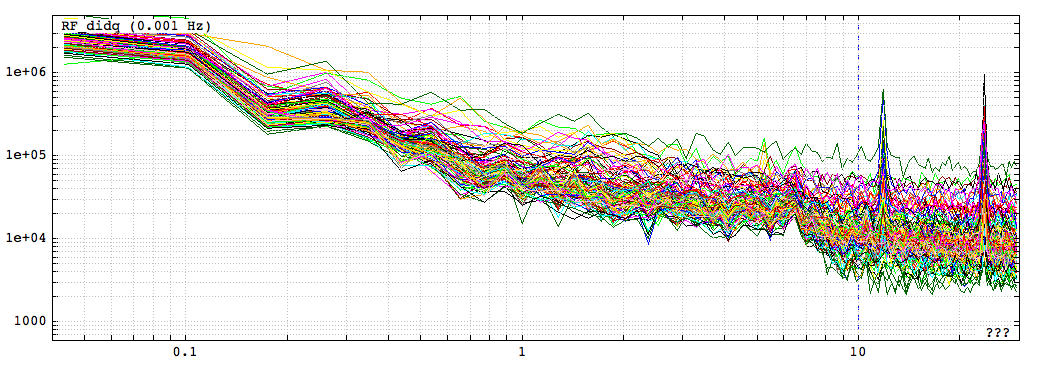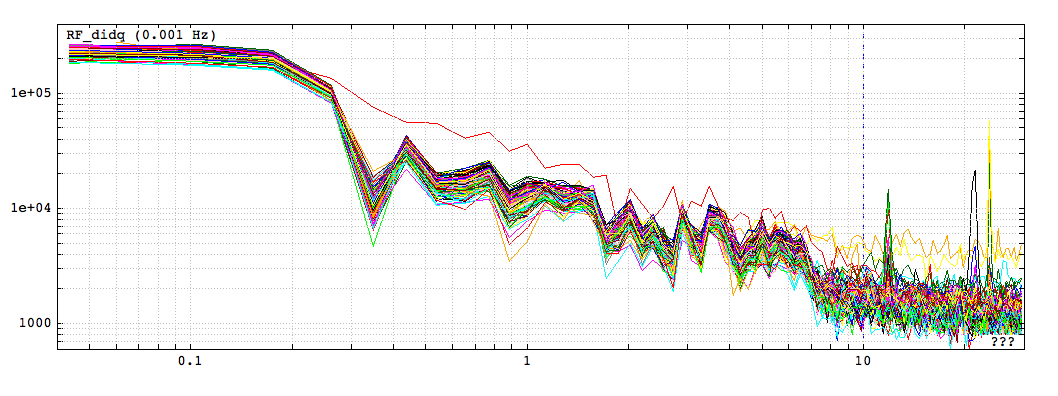|
Size: 2118
Comment:
|
Size: 9791
Comment:
|
| Deletions are marked like this. | Additions are marked like this. |
| Line 4: | Line 4: |
| <<TableOfContents(2)>> | <<TableOfContents(3)>> |
| Line 12: | Line 12: |
| Line 13: | Line 14: |
| Line 43: | Line 45: |
| Cooling down still going on. Tests on acquisition software going on. We found few problems still to be fixed. Lots of e-mails and skype conversations between IRAM and Cardiff. The status is resumed in the '''STATUS OF THE POLARISATION FACILITIES''' |
|
| Line 46: | Line 51: |
| Cooling down still going on. | |
| Line 52: | Line 56: |
| '''10h35 UT:''' T4K=25K. Tstill=31K. Flux set at 360mbar. | '''10h35 UT:''' T4K=25K. Tstill=31K. Flux set at 360mbar. Nitrogen refill. |
| Line 55: | Line 59: |
'''17h35 UT:''' T4K=5.6K. Tstill=4.74K, R_BM=1.315kOhm Flux at 172mbar. '''Condensation Started'''. '''21h40 UT:''' '''100mK!!!''' '''22h20 UT:''' Cold amplifiers on. Leak detector off. Small Nitrogen refill. We are out of IRAM nitrogen until tomorrow morning. Good Night. '''STATUS OF THE POLARISATION FACILITIES''' The new multi-layers Half Wave Plate is still in fabrication in Cardiff: all the capacitive stacks has been manufactured and tested showing results very close to expectations. The fabrication of the inductive stacks is in progress. Today at 4pm (French time) it was almost done. The plan is to set up and test the final HWP on Friday. If everything goes well someone from Cardiff will visit the telescope with the HWP on Monday or Tuesday. Therefore we have still the possibility to put the new HWP in front of the cryostat in the beginning of the observing campaign. If some delay occurs (manufacturing problems, low performance, etc...), we still have two backup solutions: 1) We use the old saphir single plate HWP which is here at the telescope. 2) People from Cardiff can give us two mesh HWPs each working in one NIKA band. The performance of these plates are presented in the two plots below. The performances are higher wrt the old saphir single plate even for the 1mm channel (much better for the 2mm channel). {{attachment:hwp1.png||width=900}} {{attachment:hwp2.png||width=900}} == October 2nd 2014 == '''04h40 UT:''' Stop Compressor. T_BM=88mK , T_still=690mK, T_4K=5.18K, J4 at 340mbar. '''06h20 UT:''' T_BM=89.2mK pretty stable (DeltaT_BM about 0.1mK over 1h), T_still=750mK (DeltaT_still about 50mK over 1h), T_4K=5.26K (DeltaT_4K about 100mK over 1h), J4 at 480mbar increasing (slope 70mbar/1h). '''08h00 UT:''' 100mK stage temperature regulated at 150mK. '''20h00 UT:''' T_BM=150mK regulated, T_still=650mK stable, T_4K=5.18K (DeltaT_4K about 300mK over 12h), J4 at 540mbar; stable. == October 3rd 2014 == Nicolas and Alessia joined the telescope. '''STATUS OF THE INSTRUMENT''' '''06h10 UT:''' T_BM=150mK regulated, T_still=650mK with 2mK variation over 12h, T_4K=5.18K (DeltaT_4K about 300mK over 12h), J4 at 540mbar; stable. '''21h25 UT:''' T_BM=150mK regulated, T_still=687mK stable, T_4K=5.23K (DeltaT_4K about 15mK over 12h), J4 at 550mbar; stable. '''First preliminary configuration with the window:''' div_kid set at 16 which means a sampling frequency equal to 59.6Hz. If it works correctly we will never change this from here after. '''1mm''' DAC gains: 20-20-20-35-44. General niveau: 6., Att. inj. 25dB (mounted into the NIKEL between the first ampli and the mixer, not changeable) + 5db at "In from Cryo" '''2mm''' DAC gains: 20-23-20-33-50. General niveau: 5., Att. inj. 20dB (mounted into the NIKEL between the first ampli and the mixer, not changeable) + 5db at "In from Cryo" {{attachment:bal1mm.png||width=900}} {{attachment:bal2mm.png||width=900}} The level of the white noise is similar with respect to the one measured in the same conditions during the previous run, BUT Strong and several peaks are present. TO BE FIXED. {{attachment:noise1mm.png||width=900}} {{attachment:noise2mm.png||width=900}} '''STATUS OF THE POLARISATION FACILITIES''' After the test of the HWP C stacks Cardiff measured the L stacks and they seemed to perform reasonably well. They clamped together the L and C stacks and they did preliminary tests rotating the stacks 'by hand': - the transmissions integrated across the band are within ~1.5%; - the cross-pol, again integrated, ~5%; The 'clamped' stacks have been sent to the clean room people, just a few minutes before they left.. and it will be now hot pressed and anti-reflection coated! On Monday morning the mesh-HWP will be taken out the oven, cut to the 11.9 cm required diameter, and finally tested with the FTS. the performance in this final version could be better due to the presence of anti reflection coating and the fact that the 1mm and 2mm bands are much narrower than the spectral band tested with the FTS. Aurelien Bideaud volunteered to come up at IRAM on Tuesday with the waveplate for staying a couple of days. We are organising flights and accomodation. Thanks Aurelien!!! == October 4th 2014 == '''09h00 UT:''' Nitrogen refill in the trap Connections fixed in the HWP modulator, it turns and the top signal is present. Finally! Last modifications of the acquisition software still not working. I am using the SVN version 5360. Noise is still present in the timelines for both arrays. It seems not to depend on acquisition software (noise is also present in the I and Q signal). I tried several things to fix it without success: 1) Changing the modulation and the sampling frequency. 2) Playing with cables 3) Stopping the 100mK temperature control 4) Playing with a drill close to the cryostat. 5) trying to attenuate the vibrations of the cryostat due to the pumps. '''19h25 UT:''' T_BM=150mK regulated, T_still=672mK with 10mK variation over 12h, T_4K=5.22K (DeltaT_4K about 10mK over 12h), J4 at 547mbar; stable. Alessia and Nico have been working on the pipeline and the set up. == October 5th 2014 == '''11h00 UT:''' T_BM=150mK regulated, T_still=665mK with 7mK variation over 12h, T_4K=5.23K (DeltaT_4K about 1mK over 12h), J4 at 554mbar; stable. The HWP modulator has been installed in front of NIKA. The prism fits well too. == October 6th 2014 == '''12h30 UT:''' T_BM=150mK regulated, T_still=659mK with 5mK variation over 12h, T_4K=5.16K (DeltaT_4K about 7mK over 12h), J4 at 560mbar; stable. '''-''' We created two parameters files: the first "run9.txt "corresponding to the same parameters of run8.txt (made on the sky) but with the new syntax for the instrument and a higher sampling frequency. The second is "run9_300K.txt" corresponding to the best tuning for 300K background (cryostat window open to the cabin) '''-'''The strange pulses observed in the signal for both arrays are still present today . Yesterday morning for few hours this signal was strongly attenuated (almost disappeared). Then in the afternoon it appears again. In the next two plot We show the comparison between the spectrum made on 18 random pixels between yesterday and this morning {{attachment:pw_extract_X_2014_10_06_10h20m09_man.png||width=900}} {{attachment:pw_extract_X_2014_10_05_12h16m17_0172_I_1633+382.png||width=900}} == October 7th 2014 == ''' - ''' Aurelien and Vincent and the HWP arrived at the telescope. We installed the HWP in front of the cryostat. The Idea is never to touch at that even for temperature measurements. We have some plot on the test on HWP performed in Cardiff we some results showing the integrated transmission in the two NIKA channels: {{attachment:nikahwp.png||width=900}} ''' - ''' Parasitic signal problems solved! We found that the origin of the periodic signal was the MM3. It was stopped and the signal became clean again. The pratical consequence is that we cannot directly monitor the temperature of the cryostat. In addition the control of the temperature is off making the arrays colder at an unknown temperature. '''15h30 UT: EYE IN THE SKY.....FINALLY!''' {{attachment:noise20141007_1mm.png||width=900}} {{attachment:noise20141007_2mm.png||width=900}} |
Contents
September 30th 2014
8h30 UT: Andrea arrives to the 30m to cool down the NIKA cryostat and to prepare all the facilities for the polarisation run.
STATUS OF THE INSTRUMENT
9h00 UT: Status of the Camera pulse tube : J1=96.3mbar - J2=329.8mbar - J3=297.3mbar - J4=160mbar - J5=350mbar
09h30 UT: Cryostat connected to the leak detector. Residual pressure in the cryostat 16mbar.
10h00 UT: Pumped the dilution circuit (until Jpi=2.2x10e-2mbar). Trap pumped.
11h UT: Pressions stables. The zero on J1 was -41mbar. Reset it again to 0mbar by changing the config file.
11h30 UT: M5 and M6 mounted. Optical alignment of the cryostat with Santiago, OK. LUNCH TIME.
12h30 UT: First Leak test. From 3x10e-9 to 2x10e-8, little scary, I'll do it again before switching on the pulse tube.
13h00 UT: Warm impedance test: between 18 and 20mbar/min at 2.9bar (ev1 closed). Consistent with the last cooling down.
13h15 UT: Circulation throught the capillar starts.
14h00 UT. Pumped ev18 for a few minutes with the turbo pump (down to 2e-4mbar). We had 0.2mbar in ev18. REMEMBER NOT TO TOUCH AGAIN ev18 from now on.
15h45 UT. Second Leak test. From 9.3x10e-9 to 2.5x10e-8. LET'S CONTINUE!
16h30 UT. Pulse Tube on. Low pressure and High pressure OK. Mixture circulates at 2.95bar (J4) and 950mbar (J2 with preref on).
20h05 UT: Lowering to 850mbar. Keep this value for the night.
20h15 UT: T4K=278K. Tstill=265K. Good night and good luck (to myself)
October 1st 2014
Cooling down still going on. Tests on acquisition software going on. We found few problems still to be fixed. Lots of e-mails and skype conversations between IRAM and Cardiff. The status is resumed in the STATUS OF THE POLARISATION FACILITIES
STATUS OF THE INSTRUMENT
05h40 UT: T4K=90K. Tstill=75K. Flux set at 630mbar.
07h00 UT: T4K=31K. Tstill=40K. Flux set at 530mbar.
10h35 UT: T4K=25K. Tstill=31K. Flux set at 360mbar. Nitrogen refill.
14h45 UT: T4K=7.2K. Tstill=10.3K. Flux set at 300mbar. Since the still and the mixing chamber are cooling down slowly, we decide to pump directly from ev17. The slope is much better.
17h35 UT: T4K=5.6K. Tstill=4.74K, R_BM=1.315kOhm Flux at 172mbar. Condensation Started.
21h40 UT: 100mK!!!
22h20 UT: Cold amplifiers on. Leak detector off. Small Nitrogen refill. We are out of IRAM nitrogen until tomorrow morning. Good Night.
STATUS OF THE POLARISATION FACILITIES
The new multi-layers Half Wave Plate is still in fabrication in Cardiff: all the capacitive stacks has been manufactured and tested showing results very close to expectations. The fabrication of the inductive stacks is in progress. Today at 4pm (French time) it was almost done. The plan is to set up and test the final HWP on Friday. If everything goes well someone from Cardiff will visit the telescope with the HWP on Monday or Tuesday. Therefore we have still the possibility to put the new HWP in front of the cryostat in the beginning of the observing campaign. If some delay occurs (manufacturing problems, low performance, etc...), we still have two backup solutions:
1) We use the old saphir single plate HWP which is here at the telescope.
2) People from Cardiff can give us two mesh HWPs each working in one NIKA band. The performance of these plates are presented in the two plots below. The performances are higher wrt the old saphir single plate even for the 1mm channel (much better for the 2mm channel).
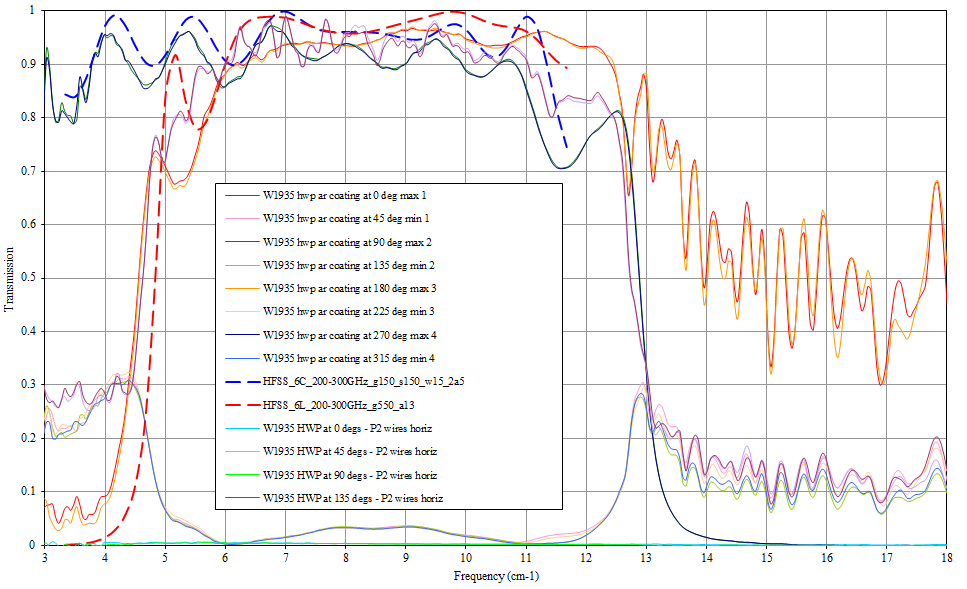
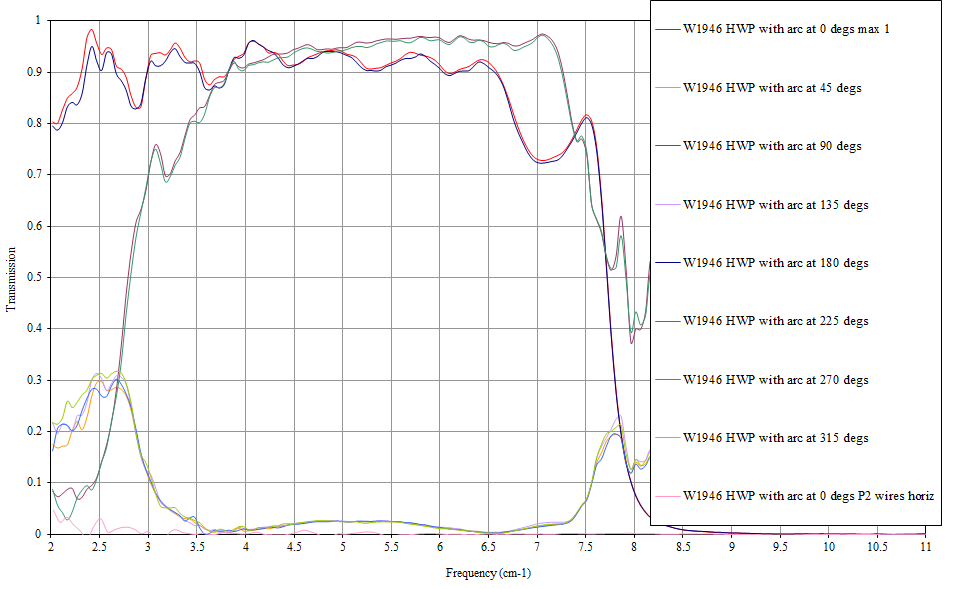
October 2nd 2014
04h40 UT: Stop Compressor. T_BM=88mK , T_still=690mK, T_4K=5.18K, J4 at 340mbar.
06h20 UT: T_BM=89.2mK pretty stable (DeltaT_BM about 0.1mK over 1h), T_still=750mK (DeltaT_still about 50mK over 1h), T_4K=5.26K (DeltaT_4K about 100mK over 1h), J4 at 480mbar increasing (slope 70mbar/1h).
08h00 UT: 100mK stage temperature regulated at 150mK.
20h00 UT: T_BM=150mK regulated, T_still=650mK stable, T_4K=5.18K (DeltaT_4K about 300mK over 12h), J4 at 540mbar; stable.
October 3rd 2014
Nicolas and Alessia joined the telescope.
STATUS OF THE INSTRUMENT
06h10 UT: T_BM=150mK regulated, T_still=650mK with 2mK variation over 12h, T_4K=5.18K (DeltaT_4K about 300mK over 12h), J4 at 540mbar; stable.
21h25 UT: T_BM=150mK regulated, T_still=687mK stable, T_4K=5.23K (DeltaT_4K about 15mK over 12h), J4 at 550mbar; stable.
First preliminary configuration with the window:
div_kid set at 16 which means a sampling frequency equal to 59.6Hz. If it works correctly we will never change this from here after.
1mm DAC gains: 20-20-20-35-44. General niveau: 6., Att. inj. 25dB (mounted into the NIKEL between the first ampli and the mixer, not changeable) + 5db at "In from Cryo"
2mm DAC gains: 20-23-20-33-50. General niveau: 5., Att. inj. 20dB (mounted into the NIKEL between the first ampli and the mixer, not changeable) + 5db at "In from Cryo"
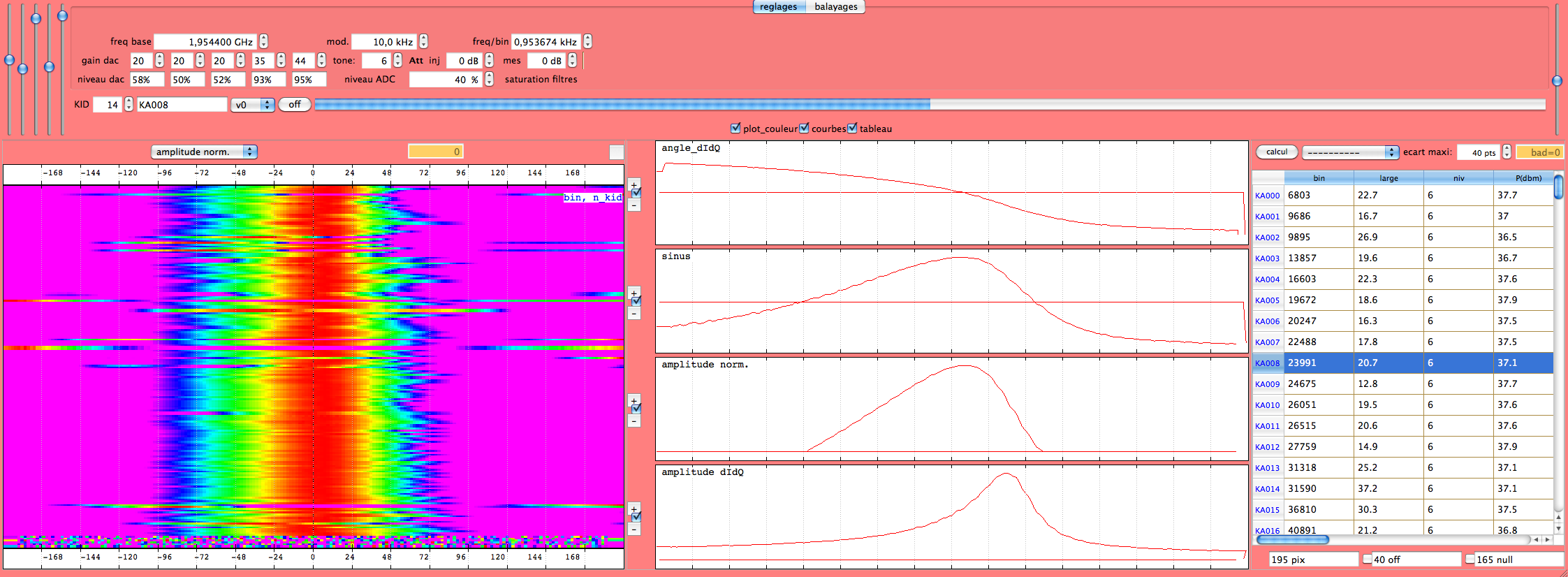
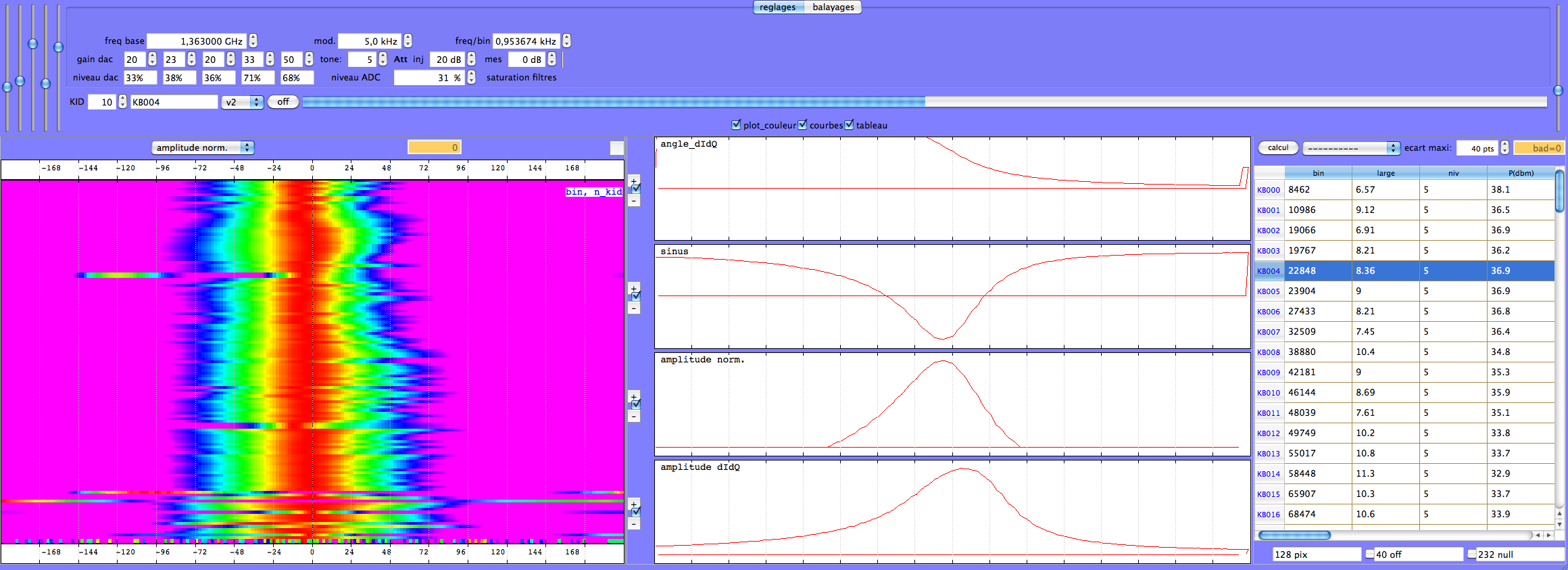
The level of the white noise is similar with respect to the one measured in the same conditions during the previous run, BUT Strong and several peaks are present. TO BE FIXED.
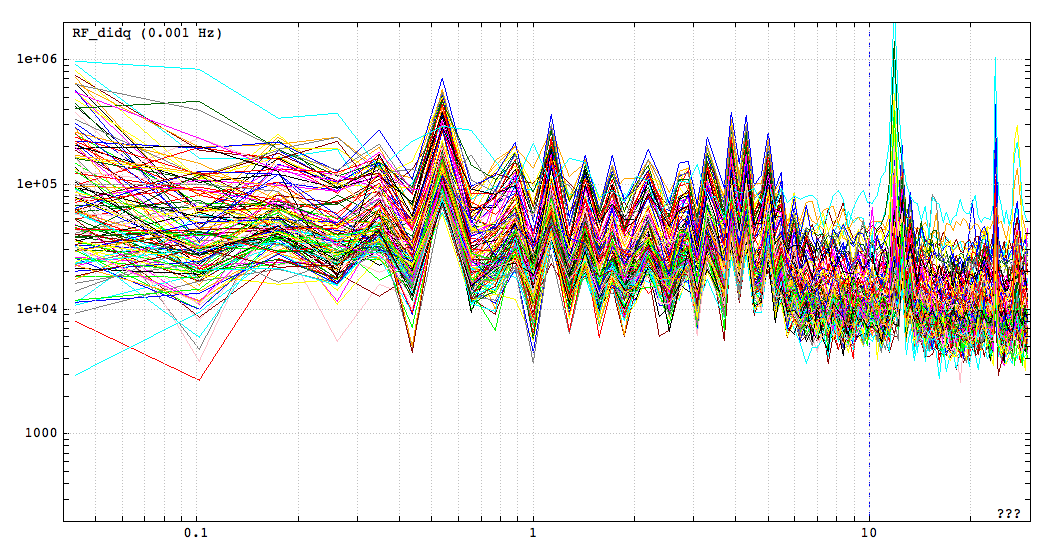
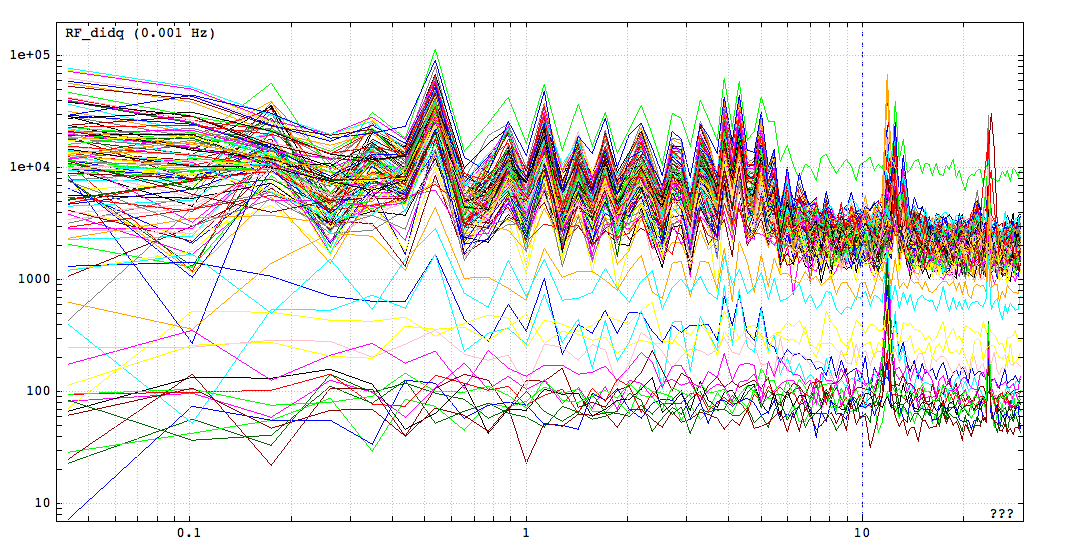
STATUS OF THE POLARISATION FACILITIES
After the test of the HWP C stacks Cardiff measured the L stacks and they seemed to perform reasonably well. They clamped together the L and C stacks and they did preliminary tests rotating the stacks 'by hand':
- - the transmissions integrated across the band are within ~1.5%; - the cross-pol, again integrated, ~5%;
The 'clamped' stacks have been sent to the clean room people, just a few minutes before they left.. and it will be now hot pressed and anti-reflection coated!
On Monday morning the mesh-HWP will be taken out the oven, cut to the 11.9 cm required diameter, and finally tested with the FTS. the performance in this final version could be better due to the presence of anti reflection coating and the fact that the 1mm and 2mm bands are much narrower than the spectral band tested with the FTS.
Aurelien Bideaud volunteered to come up at IRAM on Tuesday with the waveplate for staying a couple of days. We are organising flights and accomodation. Thanks Aurelien!!!
October 4th 2014
09h00 UT: Nitrogen refill in the trap
Connections fixed in the HWP modulator, it turns and the top signal is present. Finally!
Last modifications of the acquisition software still not working. I am using the SVN version 5360.
Noise is still present in the timelines for both arrays. It seems not to depend on acquisition software (noise is also present in the I and Q signal). I tried several things to fix it without success:
1) Changing the modulation and the sampling frequency.
2) Playing with cables
3) Stopping the 100mK temperature control
4) Playing with a drill close to the cryostat.
5) trying to attenuate the vibrations of the cryostat due to the pumps.
19h25 UT: T_BM=150mK regulated, T_still=672mK with 10mK variation over 12h, T_4K=5.22K (DeltaT_4K about 10mK over 12h), J4 at 547mbar; stable.
Alessia and Nico have been working on the pipeline and the set up.
October 5th 2014
11h00 UT: T_BM=150mK regulated, T_still=665mK with 7mK variation over 12h, T_4K=5.23K (DeltaT_4K about 1mK over 12h), J4 at 554mbar; stable.
The HWP modulator has been installed in front of NIKA. The prism fits well too.
October 6th 2014
12h30 UT: T_BM=150mK regulated, T_still=659mK with 5mK variation over 12h, T_4K=5.16K (DeltaT_4K about 7mK over 12h), J4 at 560mbar; stable.
- We created two parameters files: the first "run9.txt "corresponding to the same parameters of run8.txt (made on the sky) but with the new syntax for the instrument and a higher sampling frequency. The second is "run9_300K.txt" corresponding to the best tuning for 300K background (cryostat window open to the cabin)
-The strange pulses observed in the signal for both arrays are still present today . Yesterday morning for few hours this signal was strongly attenuated (almost disappeared). Then in the afternoon it appears again.
In the next two plot We show the comparison between the spectrum made on 18 random pixels between yesterday and this morning
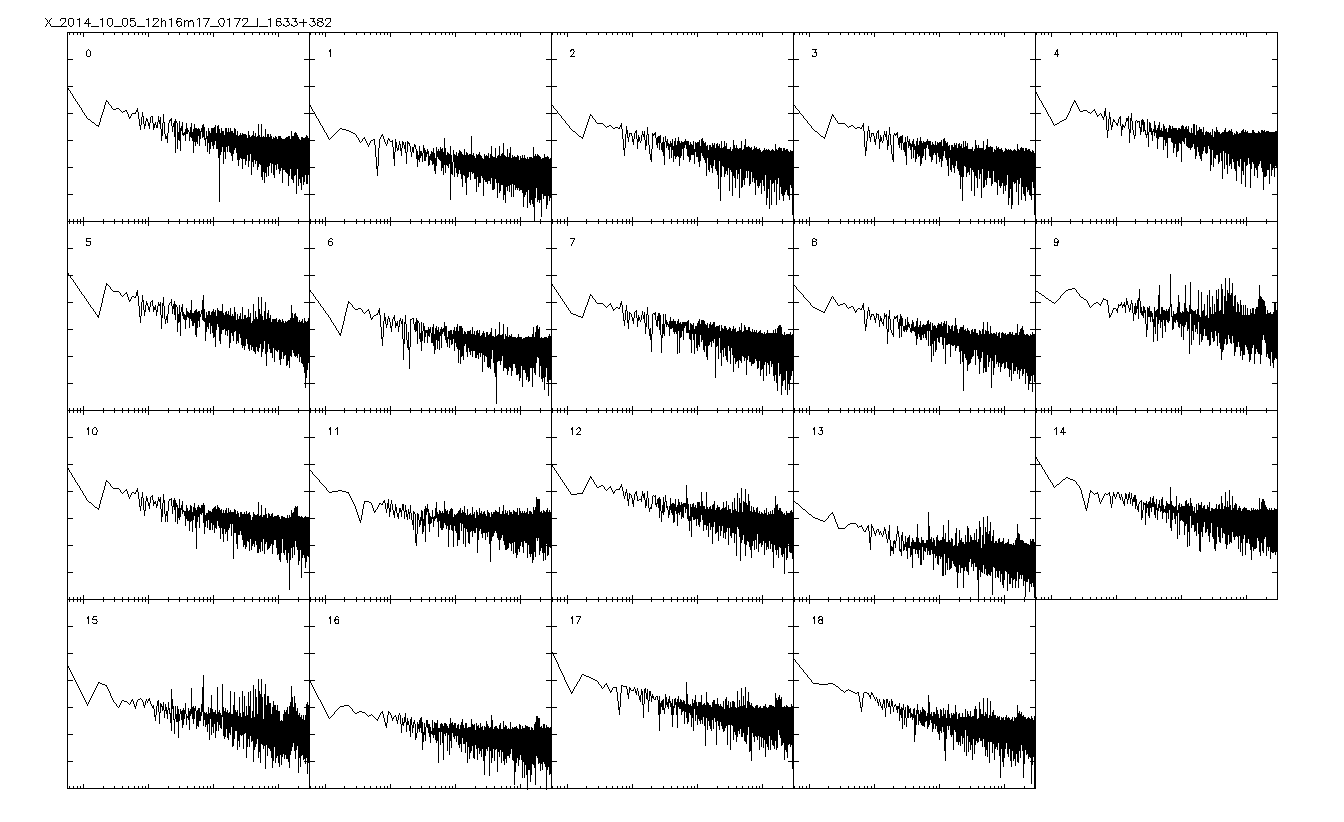
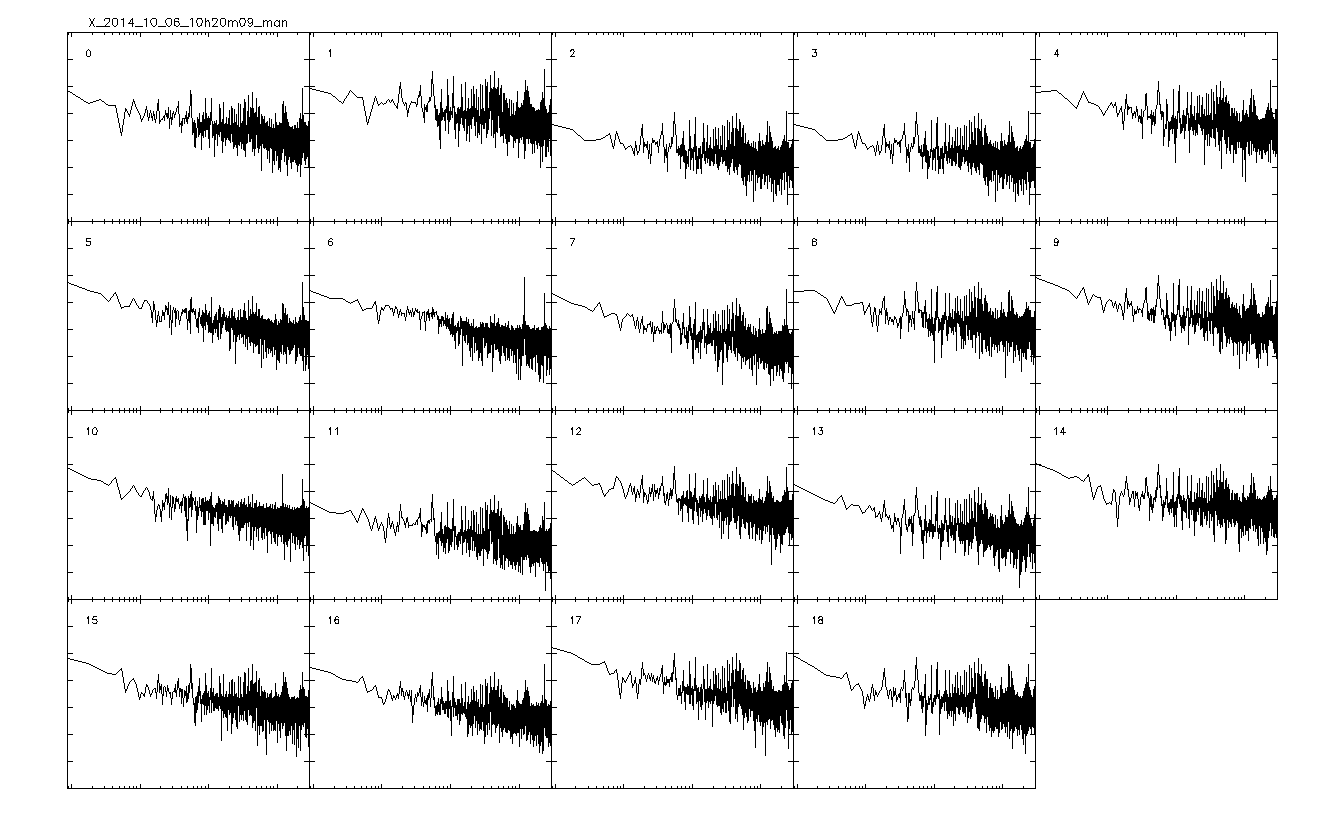
October 7th 2014
- Aurelien and Vincent and the HWP arrived at the telescope. We installed the HWP in front of the cryostat. The Idea is never to touch at that even for temperature measurements. We have some plot on the test on HWP performed in Cardiff we some results showing the integrated transmission in the two NIKA channels:
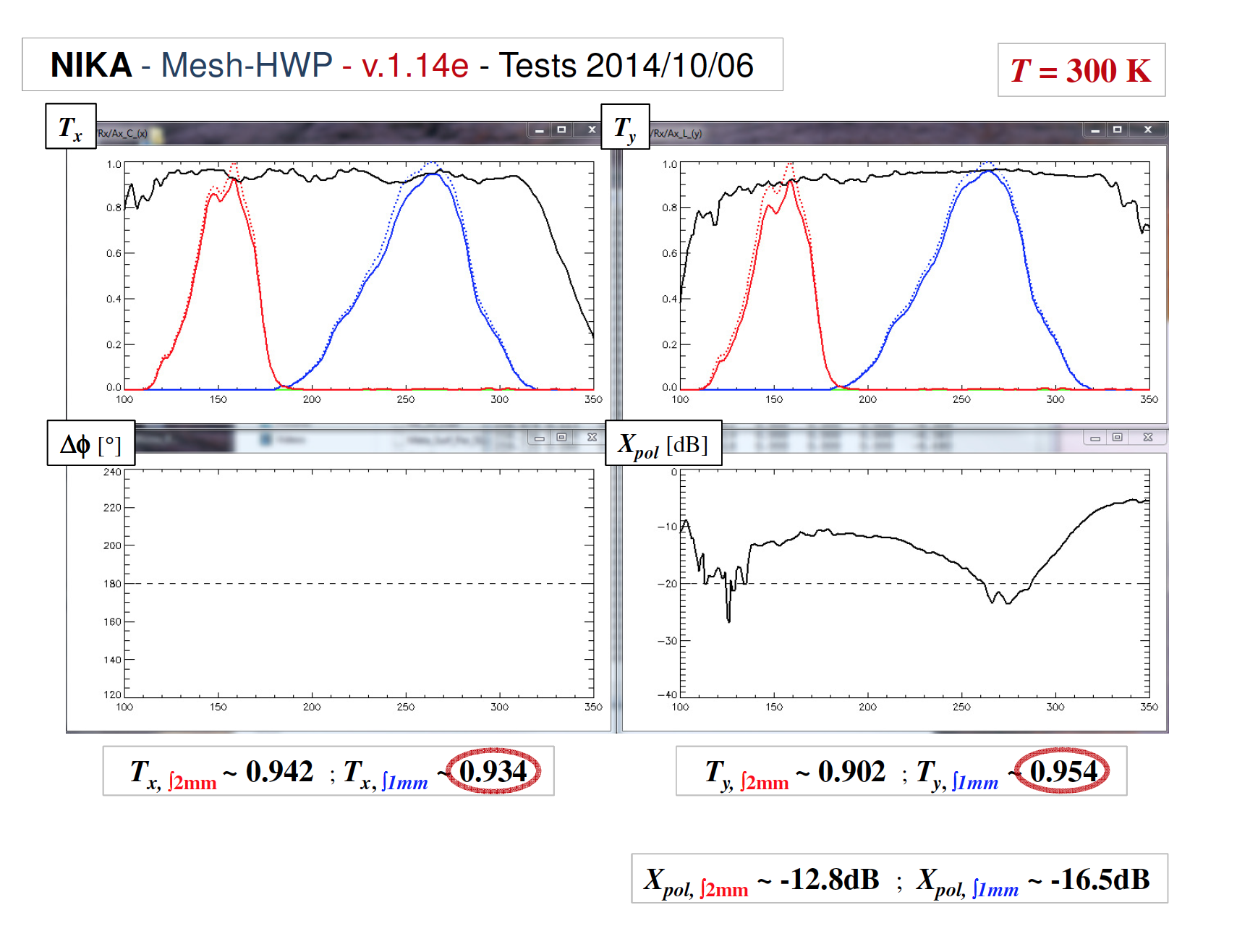
- Parasitic signal problems solved! We found that the origin of the periodic signal was the MM3. It was stopped and the signal became clean again. The pratical consequence is that we cannot directly monitor the temperature of the cryostat. In addition the control of the temperature is off making the arrays colder at an unknown temperature.
15h30 UT: EYE IN THE SKY.....FINALLY!
